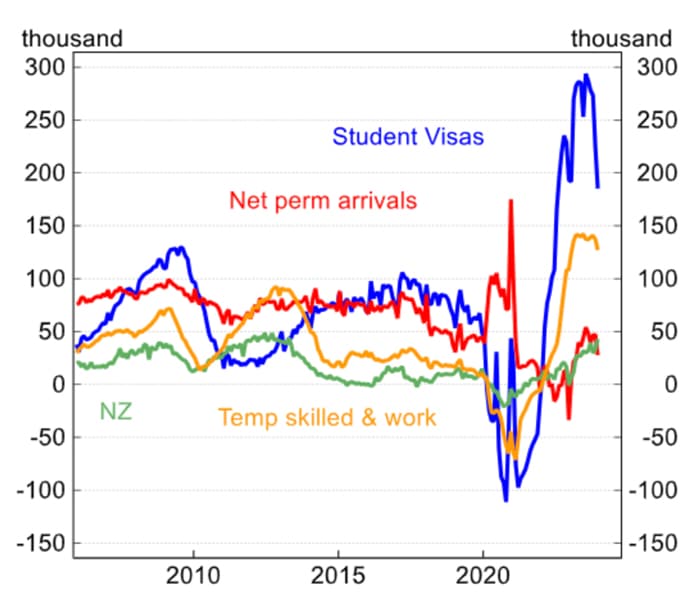Australia: Visa approval rates declining for some students as new immigration settings take effect
- Almost 1 in 5 study visa applications were refused in the first half of Australia’s fiscal year, a higher rate of refusal than in the past three years
- Should the rate hold, just over 90,000 fewer students could come into the country for the 2023/24 academic year
- Immigration officials are using new policy settings to turn away non-genuine students
- By the end of 2023, the international education sector was tracking towards contributing more export revenue to the Australian economy than in 2019, when it reached a record value of AUS$41 billion
In the latter half of 2023, the Australian government enacted new policies aimed at discouraging non-genuine students from using loopholes in the immigration system to enter the country to work under the guise of studying. Already these appear to be having an impact: Department of Home Affairs data shows that 19% of applicants were refused a study visa in the first half of Australia’s fiscal year.
Should that rate of refusal continue, the number of students granted study visas in 2023/24 is expected to decrease by 91,715 compared with 2022/23, when 577,295 visas were granted – about a 15% reduction.
For comparison’s sake:
- 10% of visas were refused in 2018/19
- 8.5% were refused in 2021/22
- 14% were refused in 2022/23
Who is getting turned away?
The targeted nature of the Australian government’s immigration overhaul announced in December 2023 means that some applicants are much more likely to be approved than others. Students now have a higher burden of proof when applying due to measures including:
- Higher English-language requirements;
- A compulsory “Genuine Student Test” aimed at distinguishing and favouring those most likely to (1) have the primary purpose of studying rather than working and (2) contribute needed skills to the Australian economy.
In effect, students pursuing lower levels of credential are those most likely to be refused a visa. International Education Association of Australia CEO Phil Honeywood explains:
“The focus has been on winding back a large number of diploma-level vocational students doing courses such as diploma of leadership, and instead the primary focus is on students who can add skills to the Australian economy.”
Other elements of Australia’s new handling of its international sector include:
- Applying additional scrutiny to high-risk student applications;
- Cracking down on unscrupulous education providers;
- Bolstering the student visa integrity unit in the Department of Home Affairs to reduce misuse of Australia’s student visa system;
- Strengthening requirements for international education providers.
The additional scrutiny is driving higher visa refusal rates as immigration officials now have more tools at their disposal for weeding out non-genuine students. A Department of Home Affairs spokesperson said:
“The department has seen increasing levels of integrity concerns across the student visa program. The department received higher levels of fraudulent documents, fraud related to English language testing, non-genuine claims and non-genuine subsequent marriages being presented in student visa applications. The department will refuse a visa application to non-genuine applicants who do not meet regulatory requirements and where fraud is present.”
Education Minister Jason Clare commented: “The Albanese government’s migration strategy and the other integrity measures we’ve put in place send a clear message that we will act to prevent the exploitation of students and protect Australia’s reputation as a high-quality international education provider.”
Net migration falling
The new approach to internationalisation in Australia is also exerting downward pressure on net migration. This was the part of the government’s intention when drafting the policies. As in Canada, the surge of so many new international students in Australia in recent months has contributed to an affordable housing crisis, which has in turn weakened public support for accepting more immigrants.
MacroBusiness.com reports that “the latest monthly arrivals and departures data from the Australian Bureau of Statistics (ABS) suggests that Australia’s net overseas migration (NOM) has passed its peak … as shown in the next chart, monthly net arrivals are finally falling from record highs.”

The next chart indicates that declining international student arrivals are driving the decline in net migration:

International education policies affect the entire economy
The past few months have seen governments in Australia, Canada, and the UK change immigration settings to affect the flow of international students across their borders. They have done so in very different ways:
- Canada’s approach includes a sweeping cap on the number of new study permits that will be granted for the next two years, as well as other measures;
- The UK no longer allows most international students to bring their dependants with them;
- Australia has taken a more targeted approach – using dozens of small tweaks that cumulatively discourage certain kinds of student, agent, and institution from misusing the system.
The new Department of Home Affairs data pointing to a likely 15% reduction in visa approvals for 2023/24 (if the current refusal rate holds) suggests that the Australian approach may result in a more modest, and more selective, reduction in new international students compared with what may happen in Canada and the UK.
In Canada, study permit processing has been suspended for many students – and that, alone, will reduce the number of students coming into the country this year, to say nothing of the effect of the two-year cap and other measures. In the UK, demand from students in top source markets is already softening in tandem with the new ban on student dependants.
But in Australia, the government seems to be balancing the huge economic value of international students with a need for greater integrity in the system. Both the policies themselves and government statements concerning them signal that new immigration rules are focused on discouraging non-genuine students – and not on dampening demand among all international students.
In the first three quarters of 2023, according to the Australian Bureau of Statistics, international education contributed AUS$34 billion to the Australian economy, up 68% in contrast to a 4.8% decline in other export categories. Universities Australia expects that sector’s final 2023 contribution will break the record set in 2019 (AUS$41 billion).
Commenting on the news, Universities Australia Chief Executive Catriona Jackson said:
“Education is the biggest export we don’t dig out of the ground. It makes us tens of billions of dollars each year, supports tens of thousands of jobs and helps pay for the essential services all Australians rely on. Beyond that, it makes us friends, acting as a bridge between nations and supporting regional stability which is only becoming more important in a fast-changing strategic environment.
Australia has developed a strong, competitive edge in the global battle for international students through our careful and strategic work over many decades. Any changes that restrict the movement of these people to our shores need to be weighed carefully against the enormous benefits they bring, during and after their studies.”
In Canada, international education has added CDN$22 billion dollars (USD$16.4 billion) to the economy in recent years, while the sector’s contribution has been measured as £41.9 billion (USD$53.2 billion) in the UK. In 2022/23, international students injected nearly US$38 billion to the US economy.
For additional background, please see:
Most Recent
-
ICEF Podcast: Together for transparency – Building global standards for ethical international student recruitment Read More
-
New analysis sounds a note of caution for UK immigration reforms Read More
-
The number of students in higher education abroad has more than tripled since the turn of the century Read More
















